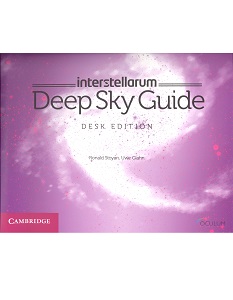This set of books is aimed at the practical astronomer, more specifically the deep sky observer. Of course, much of this information is available on the Internet, but in the experience of the lead author “most observers do research in advance and take printouts of star charts, photos, etc, into the field”. For this reason, the first volume is a “desk edition” for that research in the comfort of your own lab, lounge or lean-to, while the second volume is a “field edition” for those cold nights at the telescope.
Both editions are ring bound and similar in terms of production values, but the field edition has a hard-wearing cover and is enclosed in a protective sleeve. I’m not sure that the differences explain the large disparity in price, but it seems likely that all but the most wealthy of astronomers (which could be an oxymoron in itself) would make do with one or the other.
Following a short introduction and list of abbreviations, the catalogue “features 2362 of the ‘coolest’ deep-sky targets in the sky”, says the author, “more than most observers will see in their lifetime”. So the book is a lifetime project in the making!
Each page includes a number of objects – listed by their coordinates – and itemises those “visible in 4-inch telescopes”, 8-inch and 12-inch telescopes, and those considered “challenges for big telescopes”. The accompanying images are negatives, so that stars and galaxies appear black on a white ground, in the globally accepted manner. This is no coffee table book, but is worthy of consideration by professional observers and reasonable well-heeled amateurs alike.











